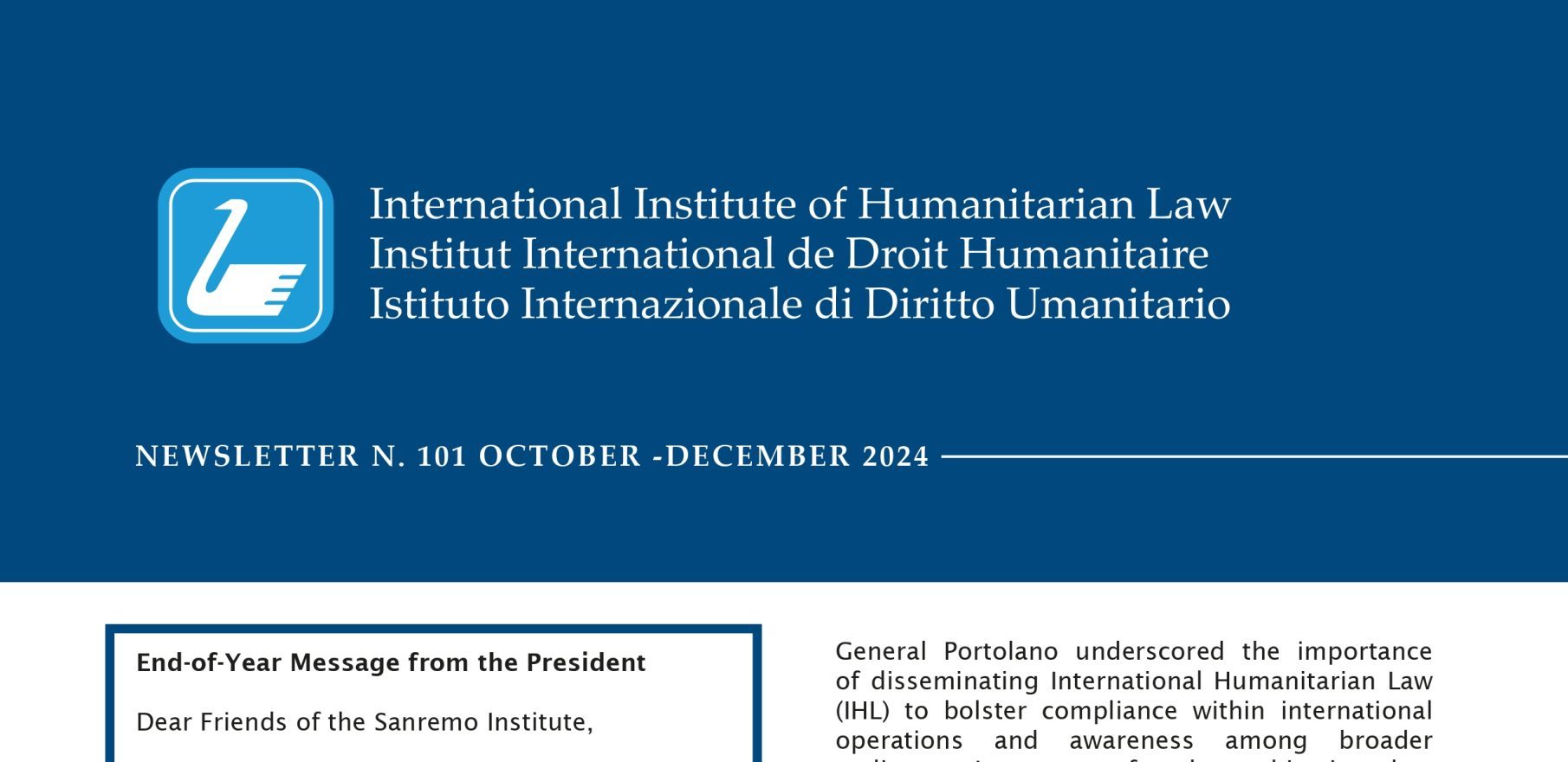Location: remote/home-based with reliable internet connection
Contractual modality: consultancy contract with possibility of extension
Remuneration: €2500 – € 3500 monthly
Deadline for applications: 22nd August 2024
Background of the Institute
The International Institute of Humanitarian Law is an independent, non-profit, humanitarian association founded in 1970 in Sanremo, Italy. The Institute organizes training courses in the fields of international humanitarian law, human rights, refugee law, and related issues and promotes dialogue by organizing international conferences, meetings, and seminars of high-level government officials, scholars, and practitioners.
The mission of the Department of International Refugee Law and Migration Law is to enhance the knowledge and skills of government officials, international organizations, civil society representatives, and academics involved in working with individuals in need of protection, including refugees, internally displaced persons (IDPs), stateless individuals, and migrants. Through its capacity-building initiatives and the exchange of experiences, the Department advocates for the preservation of human rights, thus complementing and augmenting the efforts of various stakeholders in the field of protection.
The Institute enjoys a consultative status at ECOSOC, a participatory status at the Council of Europe, and observer status at the United Nations High Commissioner for Refugees (UNHCR) ExCom, and with the International Organization for Migration.
The Coordinator oversees the initiatives of the Academic Unit and focuses on creating relationships with individual academic and training professionals and with universities and, governmental and other training institutions in line with the mandate and priorities of the Department of International Refugee Law and Migration Law of the Institute. The Coordinator oversees the update and quality of learning materials and sessions of the Department’s courses and initiatives.
The main responsibilities are as follows:
Academic Engagement and Outreach
- Recommend the strategy for cooperation and support to governmental training institutions and universities, including courses, tailored initiatives and activities;
- Oversee a database of universities and training institutions with specific initiatives relating to forced displacement and statelessness
- Coordinate the development of materials to promote the Department’s engagement with academic and training institutions
- Prepare briefing notes and dossiers for universities’ and training institutions’ engagement in forced displacement and statelessness in specific regions or countries
- Develop formal and informal cooperation frameworks with individual and institutional entities to complement the Department’s work
- Represent the Institute at external events and fora as instructed by the Director of the Department
Course Design and Implementation
- Design, coordinate and facilitate international events for academics working in the field of forced displacement, statelessness and
- Coordinate and supervise the design and implementation of selected courses of the Department and projects with universities and training institutions including:
- High-level instructional design [descriptions, objectives, audience profiles, methodological overviews]
- Individual session design [descriptions, objectives, key messages, outlines]
- Development of learning materials [presentations, exercise instruction sheets, handouts]
- Overall moderation and facilitation of live sessions [opening and closing, introduction of sessions and facilitators, facilitation of sessions and other communication]
- Selection of participants [application management]
- Communication with facilitators [invitations, briefings on specific advocacy points and content highlights, follow-up communication]
- Technical oversight of the course implementation [quality control of learning materials produced by junior personnel, learning management system course pages, etc.]
- Course evaluation reports [lessons learned and recommendations for future editions]
- Coordinate the qualitative development of learning materials, sessions and classes of the Department to ensure harmonization of updated deliverables across thematic initiatives in English, French, Spanish, Arabic and Russian.
Additional responsibilities
- Participate in the strategic planning process for the Academic Unit and the Department of International Refugee Law and Migration Law
- Oversee and support the Academic Unit’s inputs on Departmental processes, such as the preparation of reports, presentations, and other documentation relevant to the Academic Unit’s work
Management of Human Resources
- Supervise the work of specific personnel within the Academic Unit and ensure their work’s adherence to the Department’s quality standards and institutional policies
- Conduct performance reviews of personnel under supervision as per the department procedures
- Review and approve deliverables of consultants working for the Academic Unit
- Support the process of recruitment and selection of personnel for the Department
- Develop and manage a pool of qualified teaching and training professionals with the capacity to support the Department in delivering specific courses and initiatives
Official Travel and Missions
- Travel to Sanremo and third locations, as requested by the supervisor and the Director of the Department, for the purpose of delivering courses and other initiatives
- Stay abreast of trends and legal and policy developments in migration, forced displacement and statelessness and incorporate content and best practices into programs and initiatives.
- Contribute to the development and implementation of Department staff training programs on behalf of the Academic Unit
Qualifications and experience
- Four years of professional experience in human rights, refugee and migration issues, or a closely related area
- Experience working in or with various cultural contexts and global settings is an asset
- Previous professional engagement with universities and training institutions is a strong asset
- University degree in international law, international relations or similar social sciences
- Degrees from international refugee law, migration law or similar disciplines closely related to the work of the Department is an asset
- Attention to detail, accuracy, and discretion complete the profile
- Social and communication skills as well as a proactive, professional and positive attitude
- Project management skills and capacity to manage multiple projects simultaneously
- Proficiency in using digital tools and platforms such as Microsoft Office, Learning Management Systems (LMS), and virtual collaboration tools.
- Exceptional written and verbal communication skills, with the ability to convey complex legal concepts clearly and understandably to non-specialists
- Required: Fluency (written and spoken) in English
- Desired: Fluency (written and spoken) in another official UN language used by the Department (Russian, Arabic, French, Spanish) is an important asset
How to apply and selection process
- Please submit your CV and the motivation letter through this link: https://iihl.peopleforce.io/careers or https://forms.gle/G24TTNyGpERaiAXC7
- Only short-listed candidates will be contacted for interviews and other relevant assessments.
- The Institute may choose to begin the interview process before the application deadline should suitable candidates be identified.
The Institute is committed to diversity and inclusion within its workforce. All qualified candidates are encouraged to apply, irrespective of gender, nationality, religion, ethnic origin, sexual orientation, disability, pregnancy, age, or other status. Applications of persons with displacement backgrounds are particularly welcome.
![New Vacancy: Coordinator (Academic Unit) – Department of International Refugee Law and Migration Law [CLOSED]](https://iihl.org/wp-content/uploads/2022/09/vacancies.png)


